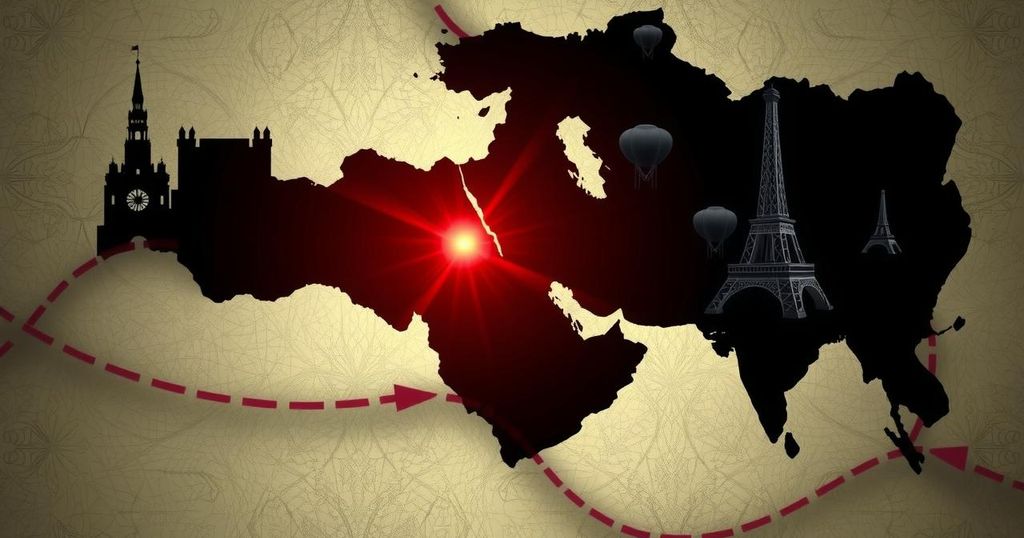Israel has intensified its military and territorial ambitions in Syria following the collapse of Bashar al-Assad’s government. The nation has seized areas in the Golan Heights and ramped up attacks on Syrian military targets, emboldened by U.S. support. Despite calls for intervention from the Arab world and the Gulf Cooperation Council, there has been little effective action to halt Israel’s expansionist actions, raising concerns about regional stability.
Following the fall of the Bashar al-Assad government in December, Israel has notably intensified its efforts in the Syrian Golan Heights by seizing the demilitarized buffer zone, a violation of the 1974 disengagement agreement with Syria. Concurrently, Israel has ramped up airstrikes on Syrian military assets throughout the nation, capitalizing on the chaos following Assad’s ousting.
The ongoing instability within Syria presents Israel with a perceived opportunity to expand its territorial claims and impose further restrictions on Syrian citizens in the southern regions, all under the pretext of establishing security buffer zones. Israeli forces have advanced significantly, now operating within 20 kilometers of Damascus, the Syrian capital.
Israeli Prime Minister Benjamin Netanyahu has expressed that the situation in Gaza, which involved extensive aerial bombardments from American-supplied jets, has empowered Israel’s broader regional ambitions, stating it opens avenues for peace accords that could reshape the Middle East. On December 23, 2024, he addressed the Knesset, highlighting these developments as strategic opportunities for Israel.
While Israel’s actions against Syria continue unabated, the Secretary-General of the Gulf Cooperation Council (GCC), Jasem Albudaiwi, has called for the international community to take decisive steps to halt Israel’s blatant violations. However, the questions arose about who is being called upon to act against Israel’s aggressive strategies in Syria.
Ironically, while calls for international intervention grow louder, Arab nations, particularly the Gulf states, have yet to enforce severe measures to compel Western nations to cease arms shipments to Israel. Albudaiwi’s political stance seems limited to discussions that may lead to ineffective resolutions at the United Nations, which would likely be thwarted by the U.S. veto.
The Arab world, consisting of 22 nations, possesses potential leverage over Israel, including significant economic tools such as oil boycotts. Nonetheless, Israel’s ongoing expansionist policies toward the West Bank appear unchecked, supported by a U.S. administration that has endorsed Israel’s claims over territories in violation of international law.
Recent reports indicate that measures are being considered to redefine the naming conventions of the occupied West Bank, with certain U.S. Congress members advocating for the historical names Judea and Samaria. This reflects a broader strategy, endorsed by politicians like Israeli Finance Minister Bezalel Smotrich, to establish a Jewish state encompassing all Palestinian territories and to extend claims to regions such as Damascus.
Turkey, a key ally of the current Syrian regime, has condemned Israel’s actions in Syria, yet it continues to facilitate oil transactions to Israel amidst these tensions. Given the power dynamics at play, and the perceived impotence of neighboring Arab nations and Turkey, Israel views Syria as an available target for further territorial gains.
Emboldened by support from the Trump administration, which recognized the occupied Golan Heights as part of Israel in March 2019, Netanyahu feels increasingly enabled to pursue his expansionist policies. This recognition has occurred despite being in direct contradiction to international law, further complicating the geopolitical landscape in the region.
In summary, Israel’s recent actions in Syria, including territorial claims in the Golan Heights and airstrikes on military positions, reflect a strategy of opportunism in the face of Syria’s instability following the fall of the Assad government. The absence of decisive action from the Arab world and tacit support from the U.S. has allowed Israel to advance its expansionist policies. This situation poses significant challenges to regional stability, especially considering the international community’s limited responses to Israel’s activities.
Original Source: www.tehrantimes.com






